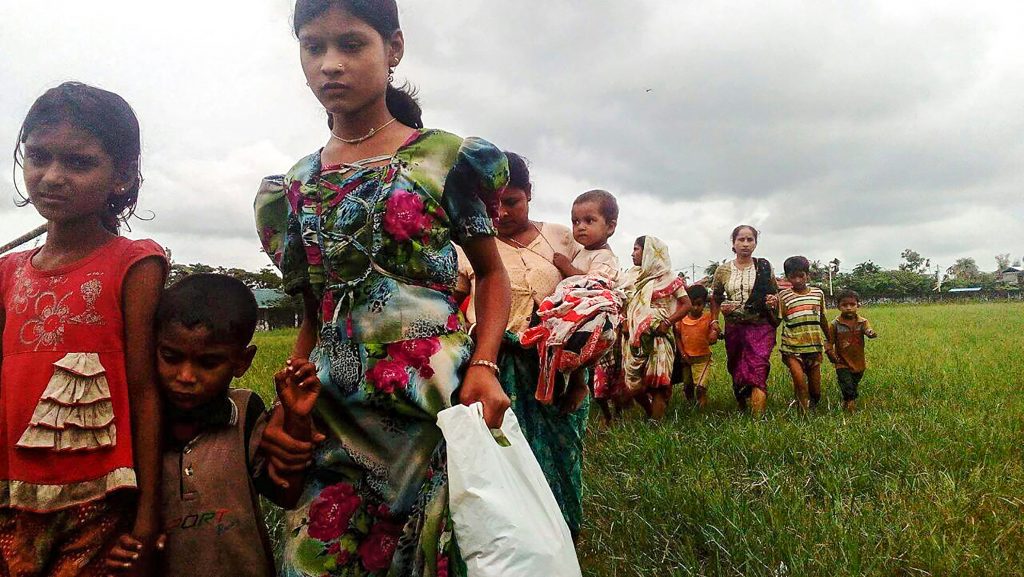By SAM JAHAN | AFP
COX’S BAZAR, Bangladesh — Myanmar security forces fired mortars and machine guns at terrified Rohingya villagers fleeing northern Rakhine State for Bangladesh on Saturday, according to an AFP reporter and a border official at the scene, as clashes which have killed scores continued for a second day.
The fighting, concentrated around remote border villages, is between suspected Rohingya militants and Myanmar security forces, but is increasingly sweeping in civilians — from the Muslim minority as well as local Buddhists and Hindus.
Violence has left at least 92 dead since Friday, according to an official toll, and forced thousands of Rohingya to flee towards Bangladesh.
But authorities there have refused to let most of them in, with thousands of people, mainly women and children, stranded along the “zero line” border zone.
On Saturday an AFP reporter at Bangladesh’s Ghumdhum border post counted over a dozen mortar shells and countless machine gun rounds fired by Myanmar security forces in nearby hills onto a large group of Rohingya desperately trying to cross.
It was not immediately clear if any were hit, but civilians scattered to evade the barrage.
“They have fired on civilians, mostly women and children, hiding in the hills near the zero line,” Border Guard Bangladesh station chief Manzurul Hassan Khan confirmed.
“They fired machine guns and mortar shells suddenly, targeting the civilians. They have not consulted with the BGB,” he added.
Unwanted by Myanmar, the Rohingya are unwelcome in Bangladesh, which already hosts hundreds of thousands of refugees from the Muslim minority who live in squalid conditions in the Cox’s Bazar area.
In desperate scenes, many of the Rohingya displaced on Friday have been left without shelter in no-man’s land between the two countries, or forced to return to villages enveloped by clashes between militants and security forces.
Hundreds did make it across the porous border early Saturday when border patrols were relaxed due to heavy rains, an AFP reporter witnessed, with some swimming across the Naf River which separates the two countries.
Bangladesh’s foreign ministry summoned Myanmar’s charge d’affaires and expressed “serious concern” at the possibility of a large-scale influx of Rohingyas following the latest violence.
‘No security’
The current flare-up came after a Myanmar government-commissioned report led by former UN chief Kofi Annan into the roots of the Rakhine troubles.
It urged Myanmar’s government to swiftly find a pathway to citizenship for the roughly one million-strong Rohingya minority and ease suffocating restrictions on work and travel.
Violence erupted early on Friday as scores of men purportedly from the Arakan Rohingya Salvation Army, ambushed Myanmar police posts.
Using knives, some guns and homemade explosives they killed at least a dozen security forces.
The fightback has seen at least 77 Rohingya militants killed, according to the office of State Counsellor Daw Aung San Suu Kyi — the highest declared single day toll since ARSA emerged as a force last year.
The group says it is fighting to protect the Rohingya from abuses by security forces and the Rakhine community who they accuse of trying to push them out.
Attacks on police posts last October sparked a wave of deadly “clearance operations” by Myanmar’s army and forced some 87,000 Rohingya to flee to Bangladesh.
The UN believes that military crackdown may have amounted to ethnic cleansing of the Rohingya.
The army denies the allegations, which included civilian killings and mass rape.
On Saturday residents of outlying villages fled to the town of Maungdaw, only to be greeted with more violence there.
Ethnic Rakhine residents armed themselves with knives and sticks as tension soared in a township that has repeatedly been host to communal violence since 2012.
With panic spreading, scores of Hindu villagers also fled to Maungdaw after rumours that they too were a target for the militants.
“There is no security in the villages,” Buthon, a Hindu man in Maungdaw told AFP.
The government has declared ARSA a terrorist organisation.
Myanmar says the group is headed by Rohingya jihadists who were trained abroad but it is unclear how large the network is and they appear to be using homespun weapons in addition to guns seized during their raids.







